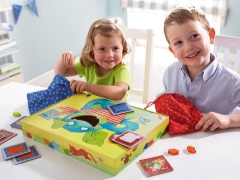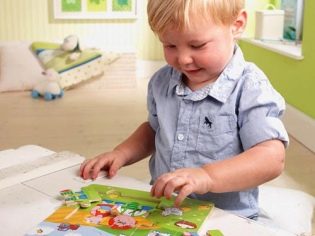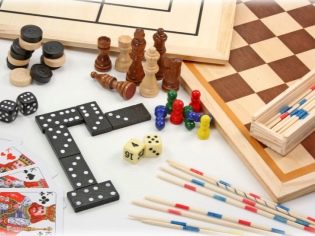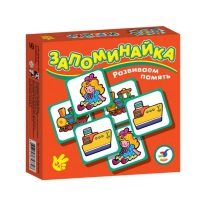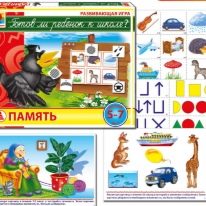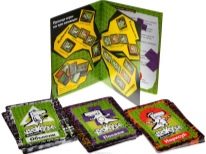The most popular board games for children for 6 years
For children 6 years of age, the games are the main kind of leisure, and not always computer games: even classic desktop versions will still fit. Most often, these gifts are chosen by parents in order to diversify children's leisure. At the same time, many completely forget that board games do not just improve their mood, they are also useful as an excellent brain training. If you want to give something to a child of 6 years old, then the board game will definitely be one of the best options. The only question is which of the most popular games to choose.
Benefit
If you still doubt that board games for children can be a real benefit (other than raising your spirits and improving your mood), then here are some examples of how an ordinary board game can positively affect a child:
- Deeply mistaken are those adults who believe that children, while playing, just have fun. Absolutely any game is a simulation of a particular situation, at least - develops the imagination. After all, everyone noticed that children never play themselves. Most often, they are in the place of certain adults, less often in the place of fabulous and other made-up characters. However, always - in a situation in which they actually do not exist.
In other words, such a child's play replaces the typical adult conversation, when one asks the other what he would do in a given situation.
It turns out that any game is of great importance - in many respects it is the modeling of the future, a kind of preparation for adult life.
Board games are also relevant. They either give the child certain new knowledge, the acquisition of which he may never have been interested in, or make him develop logic, strategic thinking, ingenuity - and even dexterity with quick response.
Of course, at this age too complex games that would give real adult skills should not be bought - their time will come later, in a few years. To prepare your child for such games, close to the real life of adults, first buy him a more simple nursery.
- The harm from the constant use of computers and other electronic devices is already obvious, but everyone has reached the stage of human development when it is almost impossible to completely abandon them. If at preschool age, parents could argue that the use of gadgets was strictly limited to the fact that there the child was only playing games, then at the age of 6-7 he goes to school.
Modern educational programs have already managed to appreciate all the advantages of digital technologies and have adopted them for a long time, so that a student cannot do without a computer. In addition, at school the kid will not spend the whole day, and his parents probably work, so now he has a lot more opportunities to play freely or sit on the Internet.
Fifteen years ago, the main danger from computers was considered to be a negative effect on the eyes, but today the main problem lies in the psychological plane, since a person, once gone into the virtual world, almost never returns from it.
The method of strict prohibition does not solve the problem, because round-the-clock control over the child is impossible, and the forbidden fruit, because of its inaccessibility, seems even sweeter.
It remains only to interest the child in something in the real world so that he himself would be ready to turn off the computer at his own will and go do something else. Board games remain one of the few really interesting alternatives for children that can pull them off their monitors.
- Another side effect of a developed information society is that people (reputedly) began to communicate less with each other. However, they communicate, but instead of live communication, it now occurs in the virtual world, which is interesting in its own way, but still a classic conversation is much better. If even those who were born much earlier than the digital era began to communicate less, then imagine how long those children who did not know any other times were drawn into it.
Virtually any board game requires the participation of at least two players, it already (one way or another) helps to establish contact between them. Everyone knows that a true friend is much better than a “friend” by correspondence, and it is possible to acquire new acquaintances and loyal comrades through board games.
Such a pastime in the family circle can give positive results in establishing a family atmosphere. As you know, only those who do not communicate with each other will never understand each other, and a board game is an excellent occasion to spend time together.
Varieties
The best children's board games are those that not only provide a certain developmental effect, but also correspond to the tastes and hobbies of the child. There are quite a lot of different types of games, even for children 6 years old, which allows you to choose something interesting for each kid. Here are some common types of board games:
- Brain teaser. By name, they may seem rather boring, but many puzzle games for kids are really interesting and exciting. The effect is achieved through colorful design and cunningly twisted plot. In some games, you need to search for treasure or catch a criminal, in others obvious opponents are other players.
- Developing memory. Usually, games of this type are built on each next player repeating the words said by the previous one and adding his own, making the task more and more difficult with each turn. The options can be very different - even to meaningless sounds that imitate the conversation of cave people, which looks as ridiculous as it is funny. In more complex versions, players do not just repeat the sounds they hear, but also have to be distracted by various additional questions, which only complicates memorization.
- Games for expanding vocabulary. At 6 years old, a child is already fluent and able to express any thoughts of his own, but this is too little to be considered a full-fledged native speaker. There are games that allow you to learn as many new words as possible, and at the same time, the concepts that they represent. Usually it looks like a task to come up with a word on a certain letter or from a certain topic, so that the child can learn a lot of new things just by listening to other participants.
Even typical "Hodilki", where the player moves his chip along the game route from start to finish, throwing a die. They help develop accounts in the mind. However, at the age of 6, children usually already feel good enough, so now it’s rather more just entertainment.
A kind of classification of board games can serve as a division into options for boys and girls. There are much more boys' games, since boys traditionally have more pronounced inclinations and talents for competitive hobbies than girls. To take at least the themes of war, pirates or spies - all this is much closer to boys, this can be implemented as a desktop strategy.
As for girls, the special games for them are much smaller, and they are dedicated perhaps to some adventures of princesses.However, worry about it is not worth it, since the vast majority of games are designed for both sexes. They are well suited for a large children's company, and for playing with your family.
Most Popular Games
The concept of the most popular game is rather arbitrary, since no one can say with accuracy how many copies and which game was sold, and even more so in the context of a purchase for children of 6 years. It should also be borne in mind that every child of this age is already a bright personality, he may have tastes that are radically different from the preferences of the majority. In any case, it is worth highlighting a few games that are very popular, so they have higher chances to please your child:
- "Crocodile". This game can be boldly called a classic one - you probably also played it, perhaps even your parents, not only in the desktop version, but in imagination. The point then was that out of the circle of children, one was chosen showing or explaining, to which someone else was guessing a word or concept, and everyone else had to guess it.
The rules differed from company to company — somewhere you could speak without naming the word itself and cognates, somewhere the explanatory answered only the leading questions of those who guess (the words "yes" or "no") In the third variant, it was impossible to speak at all - I had to show facial expressions and gestures. As a rule, the guesser would become revealing and get the task for himself.
Today this game has already become a desktop one, and there the rules are also different, but the essence is approximately the same. The tasks in such a game are no longer invented by the players: they are indicated on the cards, which according to one rules are pulled blindly, according to others - according to a certain pattern. There are even versions of a competitive nature, involving division into teams, where each team must guess the maximum words in the shortest time.
- "My Zoo". We can say that this game is the same “Monopoly”, but the entourage here is much closer to the one that the kids would like. Throwing a cube, you need to walk around the playing field and buy animals. However, they need not only to buy, but also not to forget to feed them, therefore, in a sense, the game is even a little more difficult than the classic “Monopoly”.
Of course, it is permissible to sell and buy animals not only according to the principle of what fell on the playing field, but also from each other; the same goes for feed. With an inattentive attitude towards the little animals, they can be lost, and in the end, the one who can gather the most interesting set of animals in his zoo will win.
- Adults against children. Family-type quizzes have one big disadvantage - it is not surprising that adults in general know much more than their children. The creators of this game have done everything possible to level this difference - for this, some of the questions are selected in such a way that knowing the answer to them is much easier for the child than for the adult. In addition, answering the question if you do not know what to answer is not at all necessary, but you need to dial a series of seven correct answers in a row as quickly as possible.
Those who take the risk and make a mistake will lose everything accumulated, up to a fireproof sum — two or five correct answers. It all depends on how much the player managed to gather up to this point.
For this reason, this game not only broadens the mind and allows children and adults to get to know each other better, but also differs in the element of risk and strategic planning. In addition, it is almost the only quiz-type game where even 6 years old kids can confidently fight with adults.
Tips for choosing
A wide range of board games is good because you can give the kid a dozen of them, never repeating, always pleasing the child. However, for this you need to have a great taste and clearly understand what is able to please the future owner.To make the right choice, follow a few simple tips:
- No matter how you strive to develop these or other skills of the baby, be guided while choosing not all the same to benefit, but to fascination. This adults rate board games for children by what they are capable of giving in practical terms, and it is absolutely indifferent to children whether logic develops in their game, the ability to count. In their understanding, they are just having a fun time.
- The kid is much more interested in the game, if it somehow echoes the plot close to him from a fairy tale, film or cartoon. Even if we talk about elementary games like “walkers”, which are all exactly the same, the kid will be more willing to help his beloved hero to find the treasure or free the princess, rather than play for some abstract, completely unknown character.
- In any case, the genre direction of the game should be close to the future owner. Anyone who loves active games and competitive spirit will surely prefer the game where you need to act actively, show reaction, achieve victory over the opponent thanks to not only luck, but also your own qualities. If the child is touchy or has no particular chance of winning, it is better to pay attention to those games that do not provide for winners and losers.
- Be careful - although most of the games are suitable for both boys and girls, there are those that are interesting only for one sex. Choosing such a gift, you need to consider not only the floor of the future owner of the game, but also the floor of his social circle. If this game is not suitable for someone from the company, then the child will either abandon the game or show himself worse, ignoring the comrade.
- Pay attention to age. Too simple games for a child of 6 years does not exist yet, but too complex options will quickly disappoint - no one will like to lose constantly.
At the same time, do not rely solely on the age recommendations on the box, because each child develops individually and can both be ahead of his age or fall behind him.
Reviews
The vast majority of reviews of board games for children 6 years of age is positive. It is noted that the creators were able to captivate children so much that they are able to sit for hours in the company over their favorite game, and the desktop versions can quite successfully compete with the computer.
In the process, the child's mood and communication skills are improved, logic, imagination, spatial thinking develops, vocabulary increases. In this case, board games are completely harmless, which compares favorably with modern options.
Negative reviews make up a relatively small percentage of the total mass and relate only to unsuccessfully made copies. In order not to be disappointed and not to disappoint the child, approach the choice of the most suitable present as seriously as possible.
Review the best board games in the next video.
